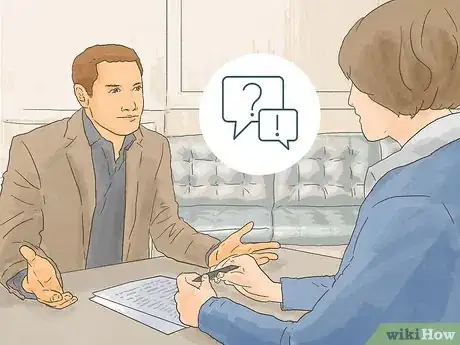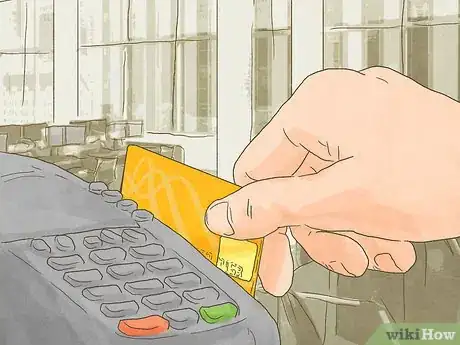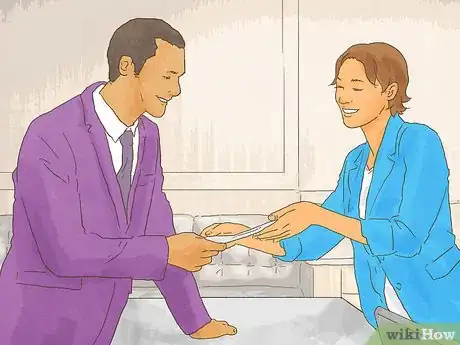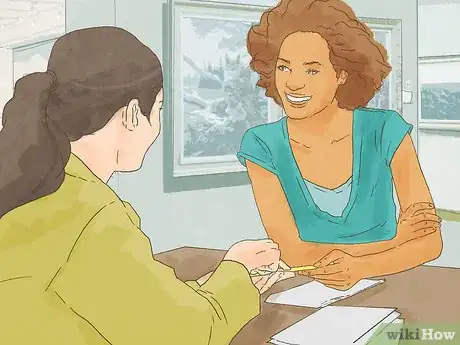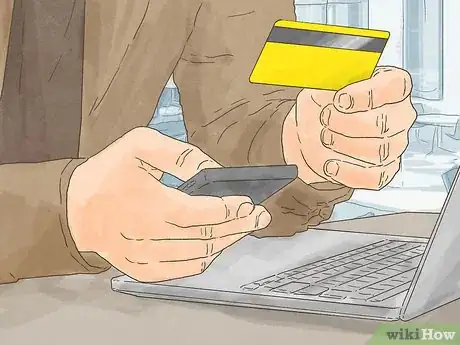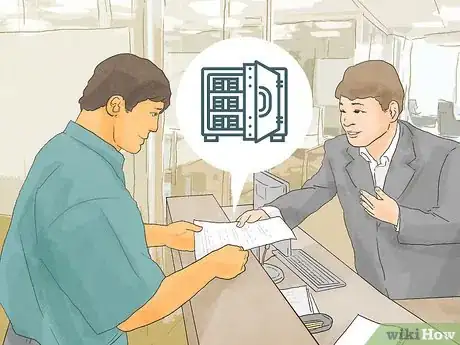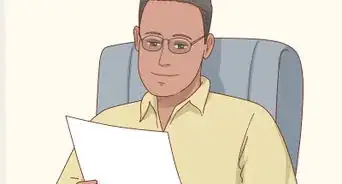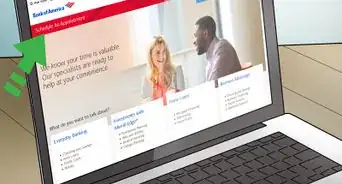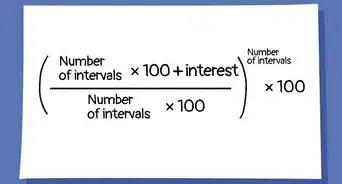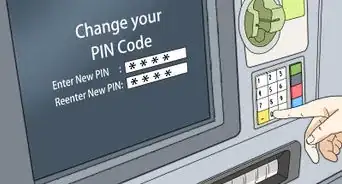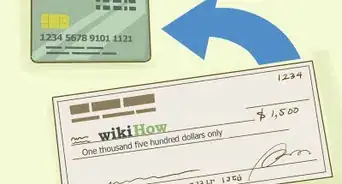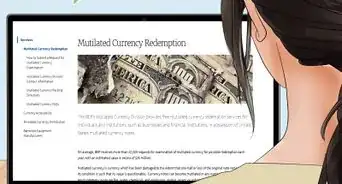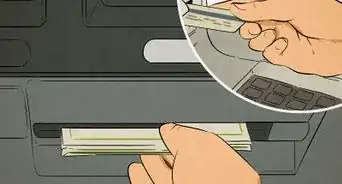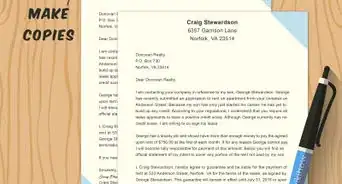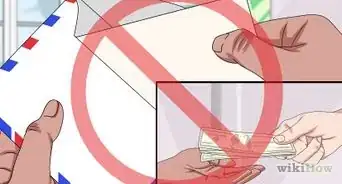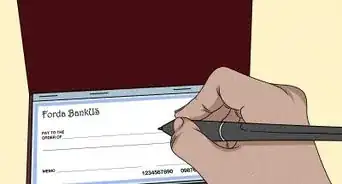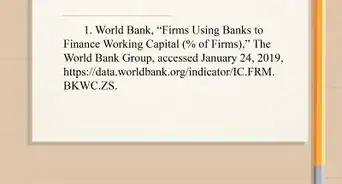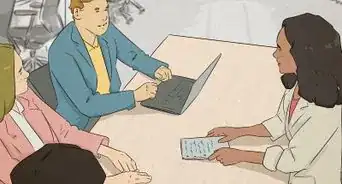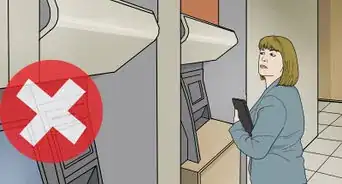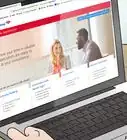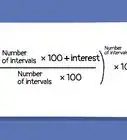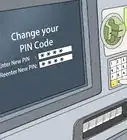This article was co-authored by Andrew Lokenauth and by wikiHow staff writer, Jennifer Mueller, JD. Andrew Lokenauth is a Finance Executive who has over 15 years of experience working on Wall St. and in Tech & Start-ups. Andrew helps management teams translate their financials into actionable business decisions. He has held positions at Goldman Sachs, Citi, and JPMorgan Asset Management. He is the founder of Fluent in Finance, a firm that provides resources to help others learn to build wealth, understand the importance of investing, create a healthy budget, strategize debt pay-off, develop a retirement roadmap, and create a personalized investing plan. His insights have been quoted in Forbes, TIME, Business Insider, Nasdaq, Yahoo Finance, BankRate, and U.S. News. Andrew has a Bachelor of Business Administration Degree (BBA), Accounting and Finance from Pace University.
There are 8 references cited in this article, which can be found at the bottom of the page.
This article has been viewed 89,325 times.
When you open a bank account, the bank is under no obligation to continue the banking relationship, and technically may close your bank account at any time and for virtually any reason. In many countries, they aren't even required to tell you why they've decided to close your account. If your bank closes your account, you must act fast to uncover the reason and try to mitigate the damage so you can open another bank account as soon as possible.[1]
Steps
Taking Immediate Action
-
1Find out why your account was closed. When you get notification from the bank that your account is being closed, that notification also may give you a reason – but not necessarily. Even if it does, it's still a good idea to call your bank's customer service number and ask.[2]
- Your country may have laws forbidding the closure of an account for a discriminatory reason, such as because of your race or gender. Aside from that, banks generally are free to close accounts for any reason or for no reason at all.
- Typically accounts are closed because you are significantly overdrawn, have had frequent overdrafts, or have bounced a number of checks.
- Keep in mind that in most cases, the bank is not required by law to tell you why they closed your account, and may refuse to give you a reason.[3]
- Calling the bank is a great idea to figure out if your account wasn't closed due to fraud, since it could mean more problems and risks for you.
-
2Determine if you're entitled to any notice. In some countries, banking law requires a bank to provide you with reasonable notice if they are going to close your account. What constitutes "reasonable" may differ significantly.[4]
- For example, New Zealand requires at least 14 days' notice, while at least 30 calendar days' notice is required in the U.K. for personal accounts.[5]
- The amount of time that constitutes reasonable notice also may depend on whether your account is a business or personal account, and whether you are the only account holder or hold the account jointly with someone else.
Advertisement -
3Review your recent purchases. If you only use your debit card for purchases, you may not have any pending transactions. However, if you've recently written a check and it hasn't cleared your account yet, you'll need to make arrangements with the merchant.[6]
- If you have online access to your account, check the list of transactions and reconcile them with your own receipts or records of purchases to figure out what's still outstanding. If you can't access your account online, go to a branch and ask for a print-out of your recent transactions.
-
4Get a check for the balance. If your account balance is positive when the bank closes your account, it should issue you a check for the balance. If your account is over drafted, on the other hand, you'll need to make arrangements to pay that off.[7]
- If you do have an overdraft on the account, try to make arrangements with the bank to get it paid as quickly as possible. Owing money to a bank can devastate your credit, and may impede you from being able to get another bank account.
- Keep in mind that while the account remains overdrawn, you also may incur additional fees, increasing the cost the longer you go without paying it.
-
5Suspend automatic payments. If you have automatic payments set up through your bank, they likely have already been stopped. However, if you have any automatic payments set up through the company you have to pay, you'll need to contact that company to have the payments stopped.[8]
- Go through your records and make sure you've gotten everything. Look out especially for payments that may only come every other month or once a year.
-
6Take care of any direct deposits. If you get your paycheck direct-deposited to your bank account, you'll need to make other arrangements before the bank closes your account for good. You may want to let a check go through, however, if you have an overdraft.[9]
- Take a look at the balance and, if there is an overdraft, talk to someone in customer service at your bank about the situation. If you over-drafted soon before your check hit, the bank may be willing to work with you to reinstate your account.
- If reinstatement isn't an option, call your employer or the payroll department as soon as possible to make sure the situation is corrected so you'll have access to your paycheck. If your employer requires direct deposit of paychecks, you may have to open another bank account first, but your employer needs to know about the situation as soon as possible.
-
7Look at your ChexSystems report. If you bank in the United States, the account closure may have been reported to ChexSystems, a consumer reporting service that provides banks with information about your banking history and relationship with banks.[10]
- There are several different companies in the U.S. that do this, but ChexSystems is the most popular. You may want to contact your bank to find out which system they use.
- You can get a copy of your report by visiting consumerdebit.com or calling 1-800-428-9623.
- If there are any inaccuracies on the report, you can dispute them with ChexSystems and they will work with the reporting institution to correct them.
-
8File a complaint with your government banking authority. If you believe the bank's closure of your account was illegal or unfair, you can take the issue to your government's banking authority. Search online to find the correct office to file your complaint.[11]
- For example, in the U.K., you would file a complaint with the Financial Ombudsman service.
- In the U.S., if you feel the bank has closed your account unfairly, go to consumerfinance.gov and file a complaint with the Consumer Financial Protection Bureau.[12]
- Before you file your complaint, gather as much information and documentation as you can of the account closure. The more information you provide the government, the better they can help you.
Opening a New Account
-
1Identify banks that do not use ChexSystems. If your bank closed your account, you may have negative information on your ChexSystems report. However, not all banks use ChexSystems. There also are some that review all applications on a case-by-case basis.[13]
- Likewise, if your bank used a different service, you should look for banks that don't use that service. These banks will be more likely to open an account for you because they won't know about what happened between you and the bank that closed your account.
- You may be able to find this information on the bank's website. If not, you can always call the toll-free customer service line and ask. Many branches also have the logo of the service they use on their doors.
-
2Try a small community bank. Smaller community banks are far more likely to review applications on a case-by-case basis, and typically are more forgiving if you had your account closed because you over-drafted or made a mistake.[14]
- If you apply for an account at a small community bank, go into the branch in person rather than applying online (many of these small banks don't even accept applications online). Dress presentably in clean, neat clothing so you make a good impression with the banker.
- Be as open and honest as possible about your past relationship with your old bank and the reason you want to open an account. This can prevent you from having problems again with this bank if they discover you lied on your application or failed to disclose important information.
-
3Consider a credit union. Since credit unions are owned by their members, they tend to be more forgiving of past mistakes. Credit unions also typically offer more assistance with budgeting and financial responsibility, if that has been a problem for you in the past.[15]
- Credit unions typically only allow certain types of people to be members. For example, they may only accept employees of certain companies, people who live in a certain community, or people who fit other criteria. Check the credit union's website to find out if you meet their membership criteria before you apply.
- You also might ask your employer if there are any credit unions you qualify for because you work there.
-
4Look for a second chance checking account. In the United States and some other countries, a number of large banks offer second chance checking accounts for people who have a history of troubled banking relationships.[16]
- Use these accounts as a last resort. They typically have annual fees and may require you to maintain a fairly substantial minimum balance at all times. They also may have other requirements that you would have difficulty meeting.
- If you do get a second chance checking account, you typically have the option of converting it to a regular account after you maintain it responsibly for a year or longer.
Using a Bank Account Responsibly
-
1Take a financial education class. In the United States, the Federal Deposit Insurance Corporation (FDIC), which insures consumers' bank deposits, offers free financial education programs that you can take online. In other countries, you may be able to find similar services.[17]
- You also can find a lot of information online or in personal finance books at your local library to help you get your financial life in order.
- If your bank account was closed due to overdrafts or bounced checks, you may want to use these resources to get a better handle on your finances.
-
2Closely monitor your bank account. If you've had problems in the past keeping up with your finances, you may want to check your bank account on a daily basis and make sure you know what's coming in and what's going out, and when.[18]
- Set up online access to your new bank account so you can check the transactions in real time.
- Use a debit card rather than checks, which will make it easier for you to keep track of your money since checks can take several days to clear your account.
-
3Stay on top of fees. If you open a new bank account, make sure you read the terms and conditions carefully and understand what fees you'll be charged and when you'll be charged them. This is especially important if you have a second chance checking account, as these typically come with more fees than a standard checking account.[19]
- If you regularly take out cash at ATMs, try to do so at your own bank's ATM rather than the ATM of another bank or third party. Even if the fee is small, these can add up and are easy to forget when you're mentally calculating how much money you have.
-
4Reconcile your bank statement every month. Your bank will send you a statement every month, whether electronically or in the mail. Even if you review your transactions online regularly, it's still important to go through this statement.
- Deadlines to report errors or fraudulent transactions, or to dispute transactions or fees, often are connected to the date the statement was issued. For this reason, it's important to review your statement and make sure everything is correct.
- Keep your own records and keep track of your receipts. You may want to use an online finance app for this purpose. Most require you to pay for a subscription, but some are free.
-
5Set up reminders for automatic payments. If you've set up automatic payments for your bills, a reminder a few days or even a week before will ensure that you check your bank account and make sure there's enough money there to cover the bill.[20]
- The reminder also puts the payment to the front of your mind, so you remember to mentally discount your balance by that amount.
-
6Link a savings account. If you have the means to do so, opening a checking and savings account at the same bank and linking the two accounts can help you avoid overdrafting your checking account in the future.[21]
- When you have a linked savings account, if your transactions exceed your balance, your bank will automatically transfer money from your savings account, or draw from the savings account rather than from your checking account.
- Check for and be aware of fees for doing this. Some banks will only withdraw a certain amount from your savings account at a time to cover overdrafts, and others charge a fee for this service, which may be as high as the fee they would charge for an overdraft or bounced check.
Community Q&A
-
QuestionWhat do I do if, after being constantly harassed by my bank, I sent a nasty email out of anger and rage, and the bank responded by closing my savings account?
 Community AnswerLike the article mentioned, a bank has the ultimate authority in keeping your account open and closing it. Your bank should not have been harassing you for whatever reason though, perhaps get legal advice.
Community AnswerLike the article mentioned, a bank has the ultimate authority in keeping your account open and closing it. Your bank should not have been harassing you for whatever reason though, perhaps get legal advice.
Expert Interview

Thanks for reading our article! If you'd like to learn more about dealing with banking problems, check out our in-depth interview with Andrew Lokenauth.
References
- ↑ http://www.financial-ombudsman.org.uk/publications/ombudsman-news/48/banking-closing-accounts.htm
- ↑ https://www.mybanktracker.com/news/bank-account-closed-5-things-you-must-do
- ↑ https://bankomb.org.nz/news-and-publications/quick-guides/item/closure-of-accounts
- ↑ https://bankomb.org.nz/news-and-publications/quick-guides/item/closure-of-accounts
- ↑ http://www.financial-ombudsman.org.uk/publications/ombudsman-news/48/banking-closing-accounts.htm
- ↑ https://www.mybanktracker.com/news/bank-account-closed-5-things-you-must-do
- ↑ https://bankomb.org.nz/news-and-publications/quick-guides/item/closure-of-accounts
- ↑ https://www.mybanktracker.com/news/bank-account-closed-5-things-you-must-do
- ↑ https://www.mybanktracker.com/news/bank-account-closed-5-things-you-must-do
- ↑ https://www.fdic.gov/consumers/consumer/news/cnwin1112/badchecks.html
- ↑ http://www.financial-ombudsman.org.uk/publications/ombudsman-news/48/banking-closing-accounts.htm
- ↑ https://www.consumerfinance.gov
- ↑ https://www.mybanktracker.com/news/second-chance-checking-account
- ↑ https://www.mybanktracker.com/news/bank-account-closed-5-things-you-must-do
- ↑ https://www.mybanktracker.com/news/bank-account-closed-5-things-you-must-do
- ↑ https://www.mybanktracker.com/news/second-chance-checking-account
- ↑ https://www.fdic.gov/consumers/consumer/moneysmart/mscbi/mscbi.html
- ↑ https://www.fdic.gov/consumers/consumer/news/cnwin1112/badchecks.html
- ↑ https://www.fdic.gov/consumers/overdraft/
- ↑ https://www.fdic.gov/consumers/consumer/news/cnwin1112/badchecks.html
- ↑ https://www.fdic.gov/consumers/overdraft/
About This Article
If your bank closed your account, you might be panicking, but try to stay calm and call your bank's customer service number to find out what's going on. Usually accounts are closed because you are significantly overdrawn, have had frequent overdrafts, or have bounced a number of checks. Ask for a check for the final balance, which will either be a refund or a fee depending on whether your account is in credit or debit. In addition to enquiring about your old account, you’ll also need to open an account with a new bank. If a bank won’t accept you, try a smaller community bank or credit union, which tend to be more forgiving of past mistakes. Make sure you transfer any direct deposits to your new account. For more tips, including how to keep your new bank account balanced, read on.
